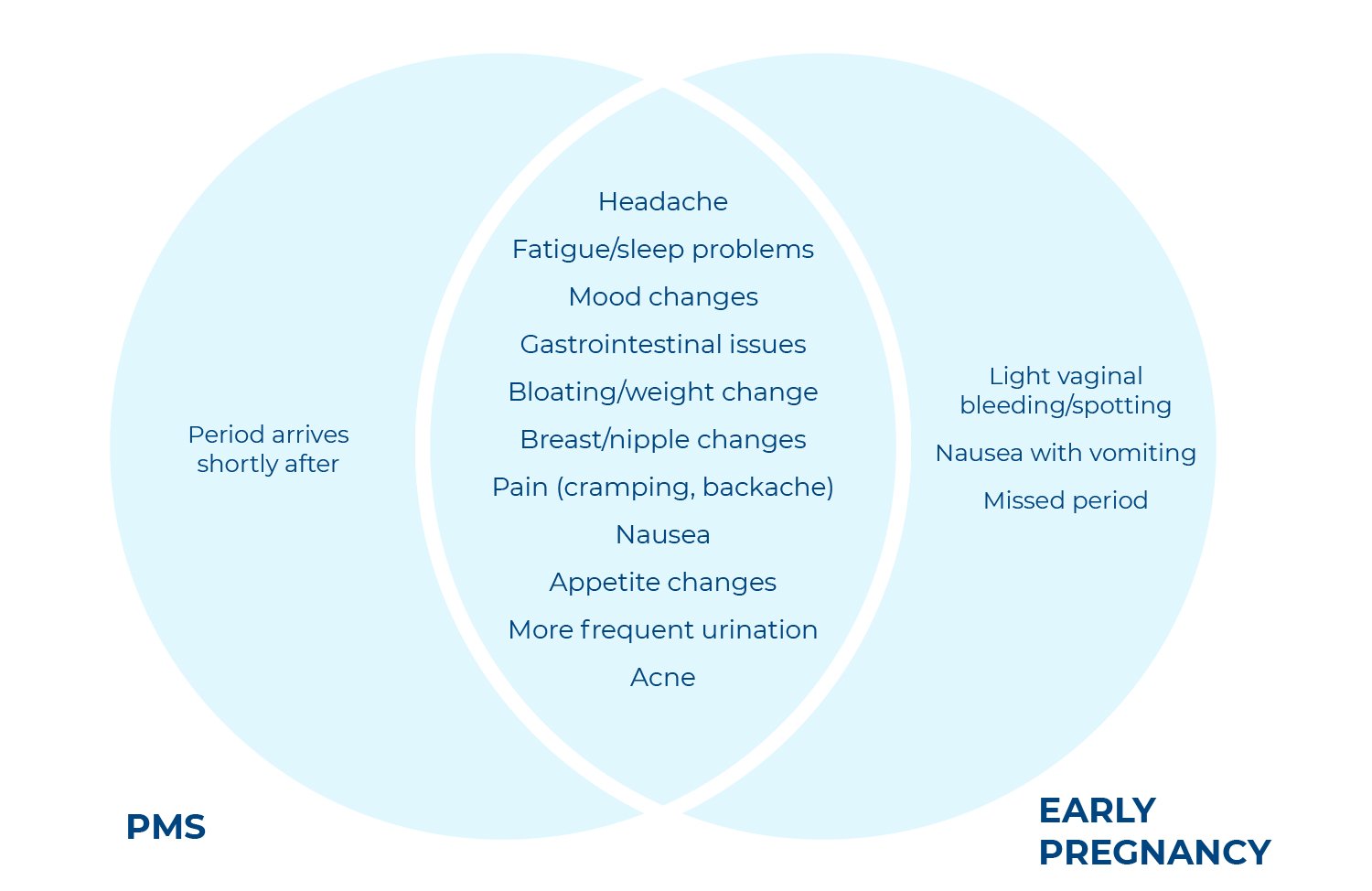
PMS or Early Pregnancy Symptoms: How to Tell the Difference
Premenstrual syndrome (PMS) and early pregnancy symptoms can be remarkably similar, making it challenging to determine the underlying cause of your symptoms. While both conditions can cause breast tenderness, bloating, fatigue, and mood swings, there are subtle differences that can help you distinguish between the two.
PMS Symptoms
PMS symptoms typically occur in the week or two leading up to your period. They are caused by hormonal fluctuations associated with the menstrual cycle. Common PMS symptoms include:
- Breast tenderness: Your breasts may become swollen, tender, and lumpy.
- Bloating: You may experience abdominal bloating and gas.
- Fatigue: You may feel tired and have difficulty concentrating.
- Mood swings: You may experience irritability, anxiety, or depression.
- Headaches: You may have mild to moderate headaches.
- Cramps: You may have mild to moderate cramps in your lower abdomen.
- Acne: You may experience breakouts on your face, chest, or back.
- Constipation or diarrhea: You may have changes in your bowel habits.
- Water retention: You may experience swelling in your hands, feet, or ankles.
Early Pregnancy Symptoms
Early pregnancy symptoms can begin as early as a week after conception. They are caused by hormonal changes associated with the developing pregnancy. Common early pregnancy symptoms include:
- Breast tenderness: Your breasts may become swollen, tender, and lumpy, similar to PMS.
- Bloating: You may experience abdominal bloating and gas, similar to PMS.
- Fatigue: You may feel tired and have difficulty concentrating, similar to PMS.
- Mood swings: You may experience irritability, anxiety, or depression, similar to PMS.
- Nausea: You may experience nausea, especially in the morning.
- Vomiting: You may vomit occasionally.
- Frequent urination: You may need to urinate more frequently than usual.
- Implantation bleeding: You may experience light spotting or bleeding around the time of implantation, which occurs about 10-14 days after conception.
- Food cravings or aversions: You may develop cravings for certain foods or an aversion to others.
- Constipation: You may experience constipation due to hormonal changes.
- Metallic taste in mouth: You may notice a metallic taste in your mouth.
- Lightheadedness or dizziness: You may feel lightheaded or dizzy, especially when standing up.
Key Differences
While PMS and early pregnancy symptoms can overlap, there are some key differences that can help you distinguish between the two:
- Timing: PMS symptoms typically occur in the week or two leading up to your period, while early pregnancy symptoms can begin as early as a week after conception.
- Nausea: Nausea is a common early pregnancy symptom that is not typically associated with PMS.
- Vomiting: Vomiting is another common early pregnancy symptom that is not typically associated with PMS.
- Frequent urination: Frequent urination is a common early pregnancy symptom that is not typically associated with PMS.
- Implantation bleeding: Implantation bleeding is a light spotting or bleeding that occurs around the time of implantation, which is not associated with PMS.
- Food cravings or aversions: Food cravings or aversions are common early pregnancy symptoms that are not typically associated with PMS.
- Metallic taste in mouth: A metallic taste in mouth is a common early pregnancy symptom that is not typically associated with PMS.
- Lightheadedness or dizziness: Lightheadedness or dizziness is a common early pregnancy symptom that is not typically associated with PMS.
When to See a Doctor
If you are unsure whether your symptoms are due to PMS or early pregnancy, it is important to see a doctor for evaluation. A doctor can perform a physical exam, ask about your symptoms, and order tests to confirm or rule out pregnancy.
Treatment
The treatment for PMS and early pregnancy symptoms will vary depending on the underlying cause. For PMS, over-the-counter pain relievers, anti-inflammatory medications, and lifestyle changes can help alleviate symptoms. For early pregnancy, there is no specific treatment, but prenatal care is important to ensure the health of the mother and baby.
Conclusion
Distinguishing between PMS and early pregnancy symptoms can be challenging, but by understanding the key differences and consulting with a doctor, you can determine the underlying cause of your symptoms and receive appropriate treatment.